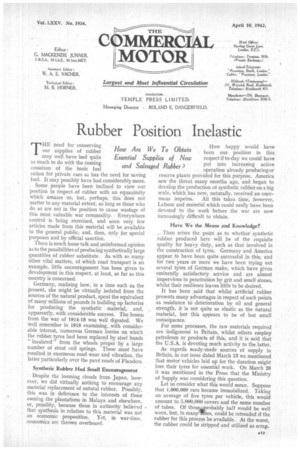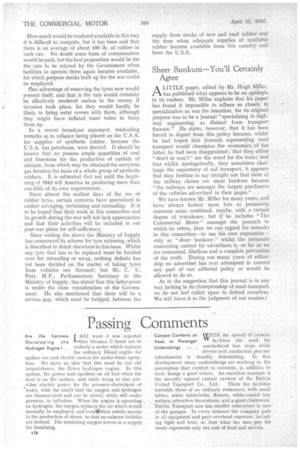Rubber Position Inelastic
Page 19

Page 20

If you've noticed an error in this article please click here to report it so we can fix it.
THE need for conserving our supplies of rubber may well have had quite as much to do with the coming cessation of the basic fuel ration for private cars as has the need for saving fuel. It may possibly have had considerably more.
Some people have been inclined to view our position in respect, of rubber with an equanimity which amazes us; but, perhaps, this does not matter to any material extent, so long as those who do so are not in the position to cause wastage of this most valuable war commodity. Everywhere control is being exercised, and soon very, few articles made from this material will be available to the general public, and, then, only for special purposes and by official sanction.
There is much loose talk and uninformed opinion as to the possibilities of producing synthetically large quantities of rubber substitute. As with so many Other vital matters, of which road transport is an example, little encouragement has been given to development in this respect, at least, so far as this country is concerned.
Germany, realizing how, in a time such as the present, she might be virtually isolated from the sources of the natural product, spent the equivalent of many millions of pounds in building up factories for producing the synthetic material, and, apparently, with considerable success. The lesson from the war of 1914-18 was well digested.. We well remember in 1918 examining, ,with considerable interest, numerous German lorries on which the rubber tyres had been replaced by steel bands " insulated" from the wheels proper by a large number of stout coil springs. These must have resulted in enormous road wear and vibration, the latter particularly over the pave roads of Flanders.
Synthetic Rubber Had Small Encouragement Despite the looming clouds from japan, however, we did virtually nothing to encourage any material replacement of natural rubber. Possibly, this was in deference to the interests of those owning the plantations in Malaya and elsewhere, or, possibly, because those in authority believed that synthesis in relation to this material was not an economic proposition. Yet, in war-time, economics are thrown overboard. How happy would have been our position in this respect if to-day we could have put into increasing active operation already producing or reserve plants provided for this purpose. America saw the threat many months ago, and began to develop the production of synthetic rubber on a big scale, which has now, naturally, received an enor mous impetus. All this takes time, however. Labour and material which could easily have been devoted to the work before the war are now increasingly difficult to obtain.
Have We the Means and Knowledge?
Then arises the point as to whethersynthetic rubber produced here will be of the requisite quality for heavy duty, such as that involved in the construction of tyres. Germany and America appear to have been quite successful in this, and for two years or more we have been trying out several tyres of German make, which have given eminently satisfactory service and are almost impervious to penetration by grit and small stones, whilst their resilience leaves little to be desired.
It has been said that whilst artificial rubber presents many advantages in respect of such points as resistance to deterioration by oil and general strength, it is not quite so elastic as the natural material, but this appears to be of but small consequence.
For some processes, the raw materials required are indigenouS to Britain, whilst others employ petroleum or products of this, and it is said that the U.S.A. is devoting much activity to the latter.
As regards ready-made sources of supply in Britain, in our issue dated March 13 we mentioned that motor vehicles laid up for the duration might lose their tyres for essential work. On March 26 it was mentioned in the Press that the Ministry of Supply was considering this question.
• Let us consider what this would mean. Suppose that 1,000,000 cars became immobilized. Taking an average of five tyres per vehicle, this would amount to 5,000,000 covers and the same number • of tubes. Of thesemprobably half would be well worn, but, in many lt ses, could be retreaded if the rubber for this process be available. At the worst, the rubber could be stripped and utilized as scrap. How much would be rendered available in this way it is difficult to compute, but it has been said that there is an average of about 100 lb. of rubber in each car. No doubt some form of compensation would be paid, but the best proposition would be for the cars to be retyred by the Government when facilities to operate them again became available, for which purpose stocks built up for the war could: be employed.
One advantage of removing the tyres now would present itself, and that is the cars would certainly be effectively rendered useless to the enemy if invasion took place, for they would hardly be likely to bring outer covers with them, although they might have inflated inner tubes to buoy them up.
In a recent broadcast statement, misleading remarks as to reliance being placed on the U.S.A. for supplies of synthetic rubber, because the U.S.A. has petroleum, were decried. It should be known that .we possess ample quantities of coal and limestone for the production of carbide of calcium, from which may be obtained the acetylene gas forming the basis of a whole group of synthetic rubbers. It is estimated that not until the beginning of 1943 will America be producing more than one-fifth of its own requirements.
Since almost the earliest days of the use of rubber tyres, certain concerns have specialized in rubber salvaging, reclaiming and retreading. It is to be hoped that their work in this connection and its growth during the war will not lack appreciation and that their activities. will be included in our post-war plans for self-sufficiency.
Since writing the above the Ministry of Supply has announced its scheme for tyre rationing, which is described in detail elsewhere in this issue. Whilst any tyre that has to be replaced must be handed over for retreading or scrap, nothing definite has yet been decided on the matter of taking tyres from vehicles not licensed ; but Mr. C. U. Peat, M.P., Parliamentary Secretary to the Ministry of Supply, has'stated that this latter point is under the close consideration of the Government. He also mentioned that there will be a serious gap, which must be bridged, between the supply from stocks of new and used rubber and the time when adequate supplies of synthetic rubber become available from this country and from the U.S.A.
Sheer Bunkum--You'll Certainly Agree
A LITTLE paper, edited by Mr. Hugh Miller, has publiShed what appears to be an apologia to its readers. Mr. Miller explains that his paper has found it impossible to adhere so closely to specialization as was the intention, for its original purpose was to be a journal "specializing in highway engineering, as distinct from transport thereon." He states, however, that it has been forced to depart from this policy because, whilst he had hoped that journals representing road transport would champion the economics_ of the latter, he had been disappointed ; that they either "don't or won't" see the wood for the trees ; and that whilst, apologetically, they sometimes challenge the supremacy of rail transport, it appears that they hesitate to say straight out that most of the railway claims are sheer bunkum because "the railways are amongst the largest purchasers of the vehicles advertised in their pages."
We have known Mr. Miller for many years„ and have always looked upon him as possessing common sense combined, maybe, with a certain degree of truculence, but if he includes "The Commercial Motor" amongst the journals to which -he refers, then we can regard his 'remarks in this connection—to use his own expression— only as "sheer bunkum," whilst the innuendo concerning control by' advertisers is, so far as we are concerned, libelous and a complete perversion of the truth. During our many years of editorship no advertiser has ever attempted to control any part of our editorial policy or would be allowed to do so.
As to the suggestion that this journal is in any way lacking in its championship of road transport, we do not feel called upon to defend ourselves. We will leave it to the judgment of our readers




















































